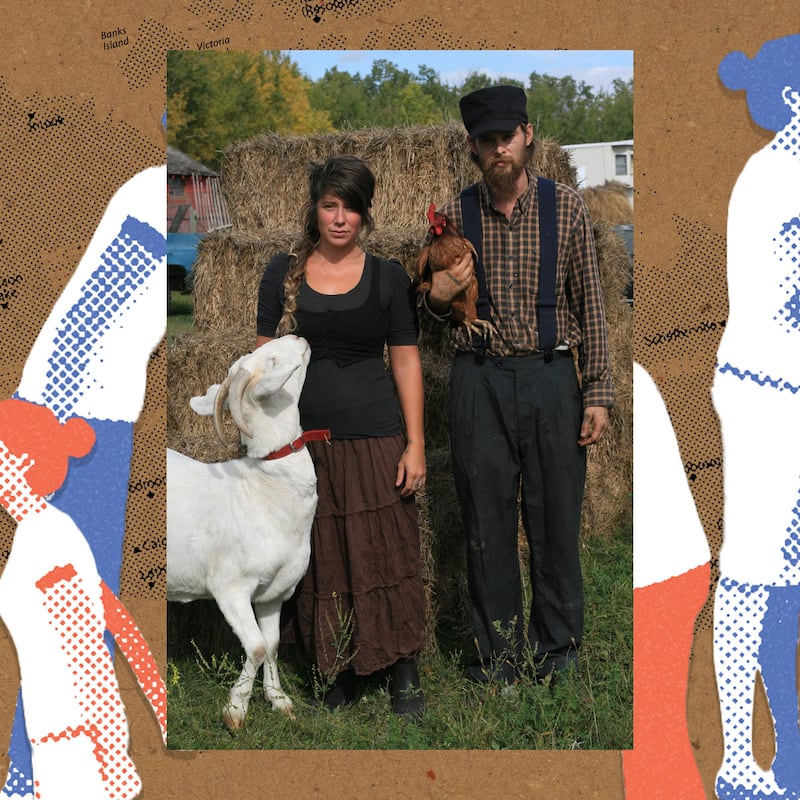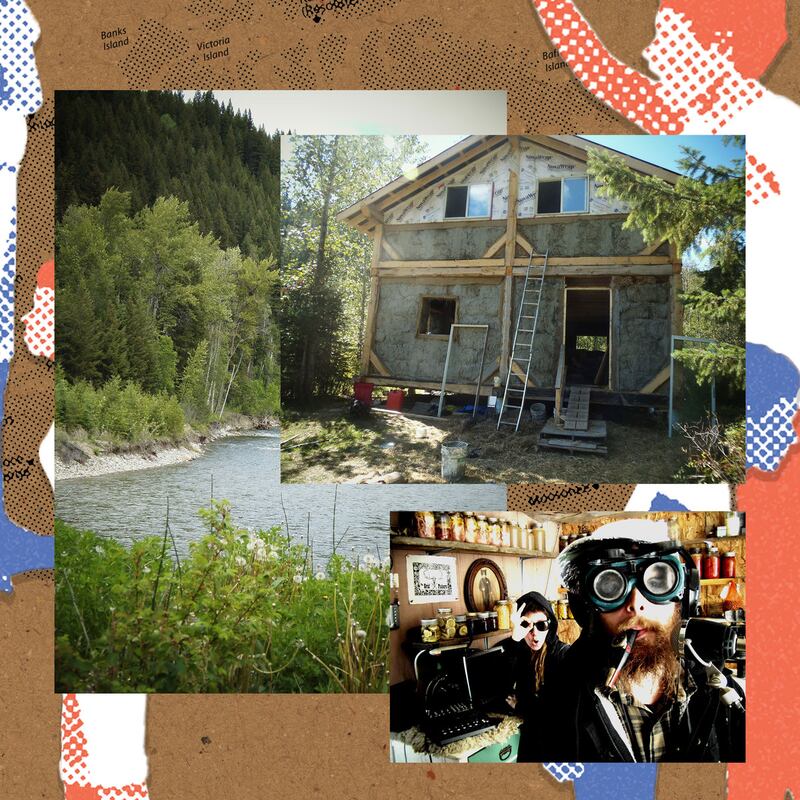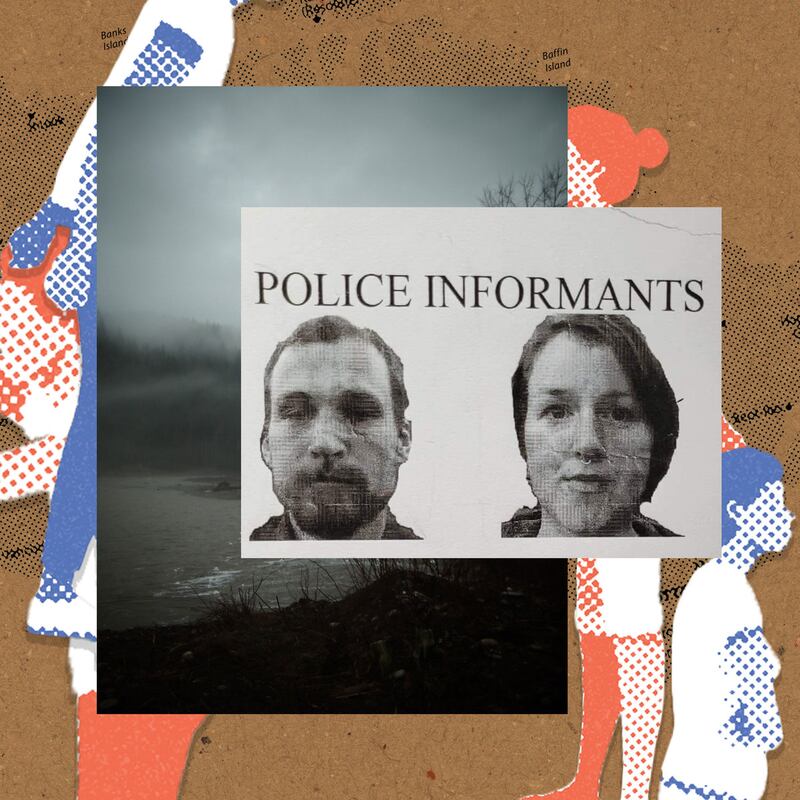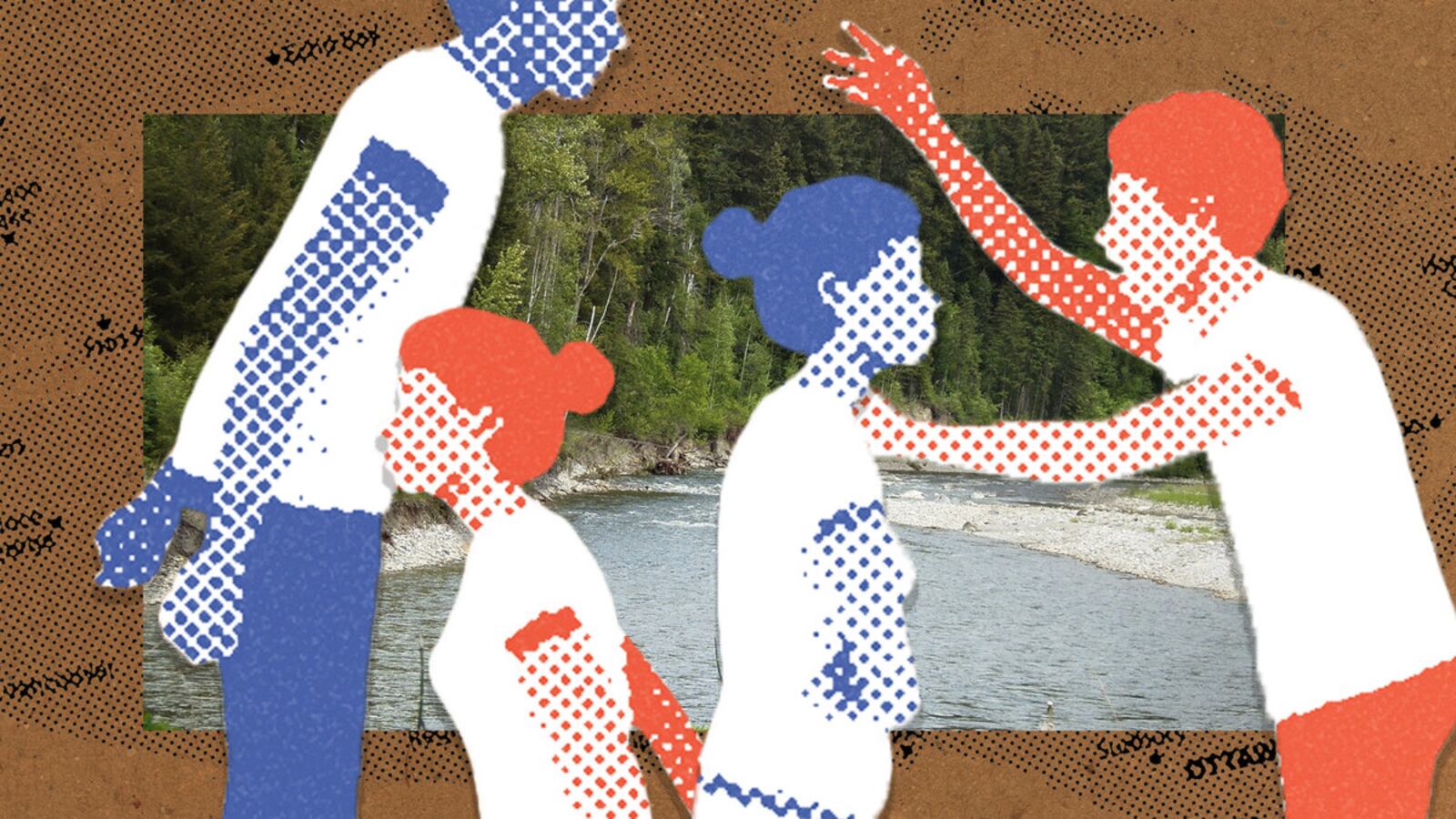Six years ago, when Michael and Rachel McKerracher first moved with Jacob and Callandra Neustater onto an idyllic swath of riverside property along British Columbia’s Cottonwood River, it was pretty hard to imagine that the freewheeling anarchists might wind up with five children, haplessly representing themselves in a public and protracted legal feud in the Supreme Court of British Columbia over chicken carcasses, junked cars and defamatory posters plastered around the nearby hamlet of Quesnel.
This outcome was especially hard to imagine because the McKerrachers and the Neustaters had once shared everything, including a hatred of the way most people lived, of cops, of the system. But these two couples who’d spent much of their lives escaping “the grid” found themselves crashing right into it—courts and lawyers and judges, while losing nearly everything they’d ever owned.
Rachel Murrin was a hobo, an itinerant hitchhiker and train hopper, fleeing conformity in the Toronto suburbs for the muck of Canada’s wildlands, hunkering through brutal winters in one communal household or another, then back on the road each spring. When she met Mike McKerracher, Rachel was wearing a train conductor hat and living with 15 people in the six rooms of an old punk house in Guelph, Ontario. They played music in the basement, luring nearby revelers to shows down there, earning just enough money to cover the electricity bill. Always just enough to survive.
Mike was a “squeegee kid,” washing windows from Vancouver to Toronto for enough money to buy a couple of slices of pizza and a bag of weed, more homeless than Rachel but a more successful musician, at least in a certain underground circuit. He was Hay Bale Mike, and he had recorded an album, sold it out of a guitar case while busking around Canada, finding himself surprised to learn here and there that someone had heard of his music.
Rachel had. She had scribbled the lyrics to one of his songs in a notebook she carried everywhere. She invited him to stick around in the punk house. They would roam the country together, often with little idea of where they’d sleep, only ever in search of what they needed to get through a night or two.

Rachel and Mike McKerracher on the Cottonwood property.
Photo Illustration by Luis G. Rendon/The Daily Beast/McKerrachersAs they grew older together, the McKerrachers wanted more of the comforts of civilized life, even as that meant inching into society and the rules they’d spent their lifetimes shunning. But they eventually wound up in one hell of a bad neighbor story—one that raises all kinds of questions about just how possible it is to run away from it all.
“It’s not about throwing chickens at each other in loincloths,” Rachel says. “This story has issues of class and money. It’s about what people are capable of. When you don’t own anything, there’s nothing to lose.”
In an era where climate change doomsayers actively plot their own retreats from society, sketching out solar-paneled tiny homes with composting toilets tucked into wooded alcoves or converted camper vans, the saga is a cautionary tale. “You could live 500 miles from anyone, at the top of a mountain where nobody ever sees you, nobody even knows you’re there, and you still run the risk of some guy helicoptering down with a clipboard and taking that away,” Mike says. “We live in a world where we’re all constantly breaking the law. How they choose to enforce it makes up that world.”
Jacob and Callandra Neustater, the couple at the other end of this feud, chose not to participate in the story, save for a few testy emails exchanged in July. “The whole mess could have been easily avoided if Mike had been willing to act like an adult instead of constantly escalating the situation,” Jake Neustater wrote to The Daily Beast. “It’s not really an off-grid story. We just foolishly purchased land with someone who turned out to be abusive and who was willing to spread lies about us to further his own agenda. I am sure many other people have been through similar situations. They probably just didn’t have their stories heard in the Supreme Court by a high-profile judge.”
McKerracher and Murrin lived like a lot of street musicians after they met, trading albums for noodles, hopping trains every time they’d “burned the spot,” i.e. cops ran them out of whatever city they were in at the time, sometimes headed east, then back west again. The lifestyle grew wearisome as they got older, and they decided they wanted more. So in a Winnipeg snowstorm, they huddled in sleeping bags and searched the internet for “cheapest houses in Canada.” That’s how they found themselves in the harsh climate of Saskatchewan, and where they found a 100-year-old schoolhouse that was trashed but had potential.
Unable to qualify for a mortgage, Rachel got a job in nearby Foam Lake as a waitress and Mike wrote a résumé pretending he had experience as a pipe fitter to land a (short-lived) gig on an oil rig, so they could rent-to-own the house. They fixed it up as best they could. However, two years after moving in they came home to find it vandalized. They decided it was time to move on and found a 50-acre parcel of land in a grid of similar properties near the tiny town of Buchanan and bought it, moving from a tent to a trailer and then to a small mobile home. They planted gardens, raised rabbits, goats, chickens and sheep. They had their first child in sub-zero temperatures.
The McKerrachers decided to name their band the Grid Pickers—an homage to their new home—and recorded an album, Cheap Kazoos and Bad Tattoos, a generator humming in the background. In 2016, they landed a provincial grant to fund a musical tour of Western Canada so the McKerrachers sold their farm animals and hit the road again—in a school bus with the band’s name painted on the outside and their three children on the inside.
Before the tour, the McKerrachers had made some new friends in the Neustaters, whom they met at a Grid Pickers house show in Onanole, Manitoba. The Neustaters were living in a cabin built on a piece of land Jake’s parents owned. Callandra “grew up into a world of song and dance,” reads a bio of hers on the Facebook page of a dance company in Quesnel, B.C. “She was able to travel extensively around the world as a child, performing for crowds in the thousands.” The Neustaters joined the Grid Pickers for part of their tour.
The two couples decided they might all want to settle a bit nearer to civilization but still live off the grid. In the spring of 2016, they found what seemed like an idyllic parcel of land—42 acres of wild roses, bear dens, right on the banks of the Cottonwood River, full of fish and a beaver pond, surrounded by Crown (federal) land near the town of Quesnel. “It smelled beautiful,” Rachel says. “Everything about it just filled me up.”
The McKerrachers could have barely afforded to buy the land outright, with the proceeds of the sale of their 50 acres, but it wouldn’t have left anything over to build a home. However, the Neustaters could get a bank loan. So the foursome split the $65,000 cost straight down the middle, and “we drove Clampett-style to B.C., without knowing what was going to happen to us next,” Rachel says. Both women were pregnant, Rachel with her fourth and Callandra with her second.
Beyond the deed they all signed to take ownership, everything else that governed how these four people would share their land was hashed out over fireside chats. By design, they put nothing in writing. While Jake and Callandra had come up in slightly more civilized and resourced surroundings, they all agreed that they wanted out of the structured, legalized, capitalist soup that they equally found so oppressive. They wanted freedom.
For the first few months of 2017, the two couples lived in barefoot harmony. “It was totally magical,” Rachel says. The McKerrachers set about building their dream home, a wood-framed four-bedroom mansion with solar panels and insulated with straw bales and clay from the beaver pond—a home that exceeded anything they’d imagined possible. Jake and Callandra started working on their place, too. They’d all agreed space from each other was important, but the foursome often spent evenings at the fireside, waxing philosophical about the state of the world from which they had all happily unhooked.

Michael and Rachel McKerracher and Cottonwood
Photo Illustration by Luis G. Rendon/The Daily Beast/GettyThen, tragedy struck. Jake and Callandra lost the child she was pregnant with when the families moved in. The McKerrachers declined to discuss it in any detail (the Neustaters not at all), but court documents reference the death, and the McKerrachers called it the moment everything changed. Jake became more and more picky about how the McKerrachers were living, Mike and Rachel said. He cared, increasingly, about everything from where they parked their cars to how they built their home to who they invited to visit. And he often made his concerns known.
Mike did his best to work amicably through what he saw as intrusive micromanaging, but he also felt like the whole point of living the way they did was so that everyone could be free from rules. “It became really obvious that Jake and Callandra didn’t come from the same background,” Rachel said. After a lifetime of homelessness and police brutality, “some really heavy systemic classist stuff, they didn’t quite understand Mike’s need for space.” Being told how to live—by anyone—was exactly what Mike and Rachel were fleeing. The more Jake complained, the angrier Mike grew.
Still, the two men sought peace, often at the behest of their cooler headed wives. Rachel urged Mike and Jake to meet and resolve their differences. At that August 2017 meeting, Mike referenced his history of resolving disputes with violence, and his familiarity with guns, he says only to make the point that resolving conflict with words wasn’t necessarily his first instinct. Jake took that as a direct threat, and he would later describe the meeting as one in which Mike had hinted he’d resort to violence if Jake didn’t back down. Mike was outraged at that interpretation. Things got worse.
On Sept. 2, the McKerrachers had a party to celebrate Mike’s birthday. The uninvited Neustaters chose that same day to butcher chickens, and to dump the birds’ carcasses in the river, upstream from Mike’s guests. Jake later claimed he didn’t know the party was happening, and by the time he learned of it, “the butchering of the chickens was already well underway,” according to court documents.
“It was such a bizarre thing to do,” Naomi Kavka, a friend of the McKerrachers who attended the party, told The Daily Beast. “It wouldn’t have even crossed my mind that someone might maliciously throw chickens in the river.”
The McKerrachers were livid. They pondered sending a group to the Neustaters to confront them. In a text, Mike wrote to Jake “Yo — I don’t know what in the fuck you are doing with your chickens but there is (sic) chicken carcasses in the water, scattered around the bush and in our yard. We’ve been chaining up our dogs at night cause of your inexperienced shit. I just scared off a bear at the bathhouse. Get your fucking shit together.”
Replied Jake, “Don’t bother talking to me until you are ready to do so respectfully. I’m not going out of my way to make you comfortable when you aren’t even willing to send me a non-offensive text message.”
Mike: “This is about attracting bears in the yard, you fucking dumb piece of shit… The last 4 chickens got thrown on your yard. The next ones go through your fucking window. You want to be my enemy? I will show you what a fucking threat is. Smarten up or I will god damn end this beef. You dumb fuck.” And after a string of more expletives: “Get your shit together you wanna be Viking bush loser.”
A mutual friend offered mediation, which didn’t happen, and then Jake made an overture. “Arlin (a mutual friend) has brought it to my attention that there are still chicken parts in the river. I am heading down there today to clean up any chicken bits in the river or around the bathhouse area. I am sorry that put your family in danger. I would never intentionally do anything to endanger your family.”
So on Sept. 21 the two men met again. Mike was still angry that Jake had suggested he’d threatened gun violence. He said Jake’s actions were “unforgivable.” “We believe you guys are a threat to our family and we are going to bring that to the community” of musicians and anarchists to which they all loosely belonged, Mike said. “Let them decide what the fuck happens.”
A week later came the point of no return—Jake replaced a padlock on the gate that secured their joint property. Mike took it as an attempt to lock his family out.
“Nice move with the lock you piece of shit,” Mike texted Jake. “I warned you. And you’re still being a passive bitch. I tried to ignore you fir (sic) the sake of your family. You keep poking me. Now it’s on.”
Replied Jake: “I am trying to avoid fighting with you and have left you alone like you asked. Now you can use your lock and we can use ours, so no need for conflict.”
Mike wrote back saying “Now we’re enemys (sic)”.
“If I see you down the hill or at the landing you will pay the price. You fucked with me for the last time if (the lock) is still there when I am back I will Fuck your shit up This is war dude.”
A few days later, Mike wrote a letter to the Neustaters telling them to either attend a community meeting or leave the property.
After some failed attempts to find a financial end to their living arrangement, someone broke open the gate to the property and vandalized Mike’s van. He was sure Jake was the culprit.
“If you don’t alert us and I see you at the land I WILL be violent towards you… you are already going to pay for what’s happened up to now… you are a trespasser here.. You will be that forever… you have until 12 noon Friday to tell me how you want this to end. If I hear nothing then it’s on and I will guarantee you that I WILL destroy your whole life and everything you own… I’ve already called in the help,” Mike wrote.
Jake and Callandra decided it was time to move, and they proposed the two couples subdivide the property so that the Neustaters could sell their half. Mike refused, insisting the couple would only entertain a payment plan or an approved buyer for the Neustaters’ half.
“You are going to call off your friends, I have photographs of them and their vehicle and the police have been notified,” Jake wrote to Mike. “If anything happens to my family, my home, or any of my stuff I will be notifying the RCMP of your marijuana business and the illegal nature of your home. I will also call CFS. Don’t ever fuck with my family. We co-own the cottonwood property, and I will go there whenever I want, I will not notify you.”
After Jake’s threat to shut down the McKerrachers and their cannabis colleagues, a series of posters mysteriously began popping up around Quesnel—the closest town to the property the Nuestaters shared with the McKerrachers. The posters had photographs of the Neustaters, with the caption “police informants,” and they included the couple’s full names, telephone numbers, street and email addresses. “They are known to infiltrate communities in British Columbia as well as Manitoba,” the text continued. “They are known to extort families by threatening Child and Family Services and RCMP unless money is paid.”

Jacob and Callandra Neustater on a poster that was found around their community after they fell out with the McKerrachers
Photo Illustration by Luis G. Rendon/The Daily Beast/GettyMike and Rachel insist they had nothing to do with the posters, but Jake and Callandra assumed it was the McKerrachers who’d put them up, and they responded, in a series of Facebook posts.
“My husband, children and I have been harassed, threatened (with violence to both body and property), we have been followed, forced from our home and property (the day our daughter was born), and been put in danger repeatedly. The people posting these posters were our friends, we bought property together, we were raising our family together. Due to these people’s mental health issues and severe paranoia they have conjured elaborate stories about us and are encouraging people to harass and hurt us,” Callandra Neustater wrote. “We have been trying to subdivide our land so we can sell and be done with these people. They are refusing and trying to scare us into giving our share of the land and home over to them by threatening us. Anyone who knows Jake and I will know these posters and the stories they claim are absurd. These people are extremely dangerous and I warn against anyone becoming involved with them.”
Callandra wrote in another post saying “we even had to dig up the ashes of our child in their resting place as we couldn’t bare (sic) having her there with what was happening.” To Callandra, this was self-defense. To Rachel, whose children went to school with folks who could potentially see Callandra’s posts, they were libelous. So in January 2018, this anarchist train-hopper took a step that she’d have previously considered unthinkable—she filed a lawsuit.
With no money for an attorney, Rachel and Mike decided to represent themselves in British Columbia’s Supreme Court, which is where defamation claims in Canada are heard. The court agreed to consider the case, and what followed was a two-year legal battle. The Neustaters hired an attorney.
In March, Supreme Court Justice Marguerite Church issued a ruling at the end of an 11-day trial siding with the Neustaters. The judge found even if the posters hung around Quesnel weren’t the work of Mike or Rachel, the photographs on the posters were taken by Mike. She found, “the description of ‘police informants’ is consistent with the language used by Mr. McKerracher in his text messages to Mr. Neustater.” The judge found that Callandra had a right to defend herself, as long as what she wrote in that defense was substantially true. “There is a privilege to hit back when one’s reputation is attacked,” she wrote. And at least in the first post, “the words she used did not go beyond countering the posters.”
Judge Church went on to say “Mr. McKerracher seemed to be influenced by his self-interest in the case, and his desire to minimize his responsibility for sending threatening text messages and his role in the creation of the posters.”
The property, which the Neustaters vacated in October of 2017 and the McKerrachers left in 2018 after police issued a trespass notice for the road they were using to access it, would be sold, the judge degreed. The proceeds, $80,000 would be split evenly between the two couples. The McKerrachers had lost—both their lawsuit and their land.
“I think it was unfortunate, a lot of key things were gleaned over. I also think the judge was just trying to put a pin in it,” Kavka said. “You both own the same amount, now stop fighting.”
Kavka, the only source beyond the McKerrachers involved with the saga who agreed to be interviewed for this story, said while she doesn’t condone anything Mike said or did, she also sees the Neustaters’ actions (the chicken incident, for example) as violence, and suggested their behavior was just more passive-aggressive, “WASPy, east coast polite Canadians avoiding things until they explode.”
“The ‘libertarian fantasy’ of living off the grid, making your own rules, it’s not possible. We’re not living in an apocalypse where the grid has gone down and if we don’t figure this out we will die. For a lot of people, they can go back to the other house that has power,” Kavka said.
To Mike and Rachel, what’s cautionary about the saga is the fallacy that anyone can truly escape society, its trappings and its laws. When they were street kids, they got beaten up by the cops for sleeping on sidewalks and train cars. When they owned the schoolhouse in Saskatchewan, they got chased out of the community for being too nonconformist. When they entered into a communal living arrangement with zero written agreements about how they might respect one another’s rights and privacy, the informal setup came back to haunt them.
If there’s a way to live both in anarchy and harmony, this wasn’t it.

